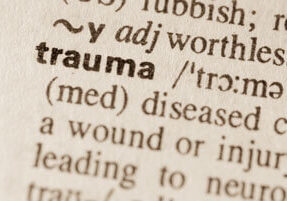Do I Have Complex Trauma?

Did you know that over 70% of Americans have experienced some form of a traumatic experience in their lifetimes? Despite the prevalence of trauma, research continues to move painfully slow on the treatment and recovery of trauma patients. Overall, the understanding and acceptance of complex trauma is nowhere near what it could be in the mental health world, but Breath’s founding Executive Clinical Director is one of the nation’s foremost trauma therapists, and because of that, trauma therapy is one of the fundamental aspects of a whole life recovery at Breathe.
One of the major elements of trauma that is commonly misunderstood, is the difference between a traumatic experience and a complex trauma survivor. Many people are aware that trauma can come from a car accident, a physical altercation, a natural disaster, a divorce, etc., however, there is another form of trauma that is onset by repeated or back to back traumatic experiences called Complex Trauma.
Who Experiences Complex Trauma?
While a majority of Americans have experienced some sort of trauma, the number dwindles when we begin to discuss the prevalence of complex trauma survivors. In comparison to the singular traumatic events that many people experience, people who experience complex trauma tend to live in these traumatic states for a certain period of time.
For example, someone with PTSD from a car accident, a horrific injury, or a physical fight, usually only experienced that event one time. This does not mean that their PTSD is not severe, or that it doesn’t intrude upon their lives, but it means that their PTSD came from one singular isolated incident that continues to haunt them until they can seek counseling or treatment for the event.
People who experience or suffer from complex trauma, on the other hand, are usually people who experience the same degree of trauma for any continued length of time. The most common groups of people who experience complex PTSD are those who:
- Experience repeated physical, sexual, or mental abuse
- Victims of Kidnapping
- People who experience war for extended lengths of time (fighting in or running from)
- Prisoners of war
- Victims of human or sex trafficking
- Children who grow up in alcoholic or addict households
- People who experience repeated bullying
The different scenarios can continue on and on, but the varying factor between a “normal” traumatic event and someone who experiences complex trauma is determined by how frequently that person goes through the trauma.
Effects of Complex Trauma
People who experience back to back situations that are traumatic are often unable to heal between these episodes. This can lead to a steady decline in the person’s wellbeing since they are not able to recover from the last experience before the next one.
Take, for example, a child of an alcoholic parent. The child never knows how the parent will come home, how they should act, or when or if they will receive love or care. This can alter the child’s ability to attach to their parent in a healthy way, leaving them unaware of how to form relationships in their later life. It also forces the child to learn how to deal with life in unhealthy ways, either through cowering in fear or shutting the world off entirely.
People who are prisoners of human sex trafficking are repeatedly forced over and over into non-consensual sex acts. These people are usually cut off from access to regular bathing, healthy social interactions, and proper health care. This complete degradation of their safety, privacy, and well being can completely devastate their self-confidence, self-reliance, and feeling of security. Over time, this can cause the person to completely shut down their emotions in an effort to block it out, or they can live in a state of constant anxiety and fear for their own wellbeing.

The Symptoms of Complex Trauma
People who have experienced repeated trauma will often carry the same symptoms and characteristics as those who have PTSD, however, there are often deeper rooted symptoms that have become ingrained in the person that can make it very difficult to heal, especially if the person has been dealing with this trauma since childhood. Some of these symptoms are:
- Extreme and persistent depression
- Explosive anger
- Feeling helpless, shameful, or guilty, even when a situation wasn’t their fault
- Isolation and distrust
- Victimization
- A preoccupation with their abuser or with getting revenge on their abuser
For many people, harboring untreated trauma can begin to become all-encompassing in their lives. Unresolved trauma is largely believed to be a reason why many trauma survivors resort to drug abuse, self-harm, eating disorders, and other erratic behaviors, as an attempt to find some sort of control over the pain that they feel.
It is very troubling when a child who was sexually abused grows up to become hyper-sexualized, engaging in risky sexual behaviors, and even growing into prostitution. It can be confusing and difficult to separate the idea in that person’s mind that their need to feel love and validation through sex developed from sexual abuse as a child.
Most complex trauma patients begin to engage in these destructive habits in one form or another. Many soldiers of war experience a drinking or drugging problem after they have returned home, and many people who grow up in an alcoholic household tend to develop alcoholism.
Treating Complex Trauma
Over the last few decades, more and more research has gone into the treatment of trauma in any and all forms. Due to this research, therapeutic modalities have been created that focus specifically on or aid in the healing of traumatic memories for the purpose of allowing the individual to live the healthiest and meaningful life possible. These techniques are used at Breathe Life Healing Centers to give our clients the best chance of recovery. Some of these modalities are:
- EMDR: Eye Movement Desensitization and Reprocessing Therapy is a proven method of therapy that centers around rewiring the neurological pathways in the brain in order to associate the trauma to an accepted or more constructive thought pattern. It takes place with a licensed EMDR therapist and has been found to be the most successful form of trauma therapy available.
- Neurofeedback: Neurofeedback involves taking scans of the brain during therapy sessions that allow the individual and the therapist to visually observe the changes in the brain that occur when discussing trauma. When used in conjunction with EMDR, these processes are extremely helpful in giving clients a visual connection between the power that their trauma has on them and an achievable measure at which they can observe their healing.
Psychotherapy and medication have also been extremely helpful tools in the recovery of trauma, as well as group therapy and esteemable actions. Because of this, Breathe centers focus on creating an environment of the whole body, whole mind healing that allows the individual to regain their self-confidence, heal at their own pace, and live in a community of people who uphold compassion and understanding for the complex trauma process.
HOW TO GET HELP FOR COMPLEX TRAUMA NOW
There are endless amounts of organizations, fellowships, and treatment facilities that are geared toward helping people who suffer from complex trauma. Breathe Life Healing Centers, located in Los Angeles, utilizes a multipronged approach that helps heal the underlying pain through dialectical behavior therapy, family therapy, support groups, self-care education, and life-skills learning.
Struggles with trauma don’t have to go on forever, healing and recovery are possible.
To Inquire About Breathe Life Healing Centers, Please Call
Our Helpline 24/7 at (800) 929-5904
Get Help Now
Send us a message and a member of our team will be in touch shortly.
